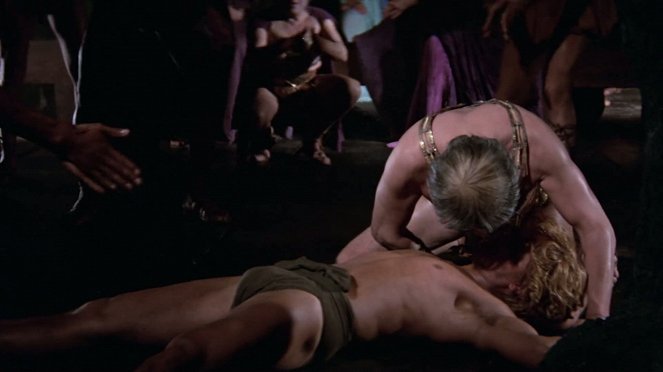Directed by:
Federico FelliniCinematography:
Giuseppe RotunnoComposer:
Nino RotaCast:
Martin Potter, Hiram Keller, Salvo Randone, Magali Noël, Capucine, Alain Cuny, Lucia Bosé, George Eastman, Ennio Antonelli, Carole André, Gordon Mitchell (more)Plots(1)
Encolpius is a Roman student who begins by arguing with his friend Ascyltus over the affections of androgynous youth Giton. Ascyltus wins, whereupon Encolpius embarks upon an odyssey, partaking in a drunken orgy and being kidnapped by a bisexual sea captain and his concubine. Encolpius eventually rejoins Ascyltus to visit a suicidal Roman couple, join in a plot to kidnap a "sacred" hermaphrodite, and much more. Loosely based on the book "Satyricon" by Gaius Petronius, the "Arbiter of Elegance" in the court of Nero, Federico Fellini wrote and directed this tongue-in-cheek hymn to the "glories" of pagan times via a bizarre journey through the decadence and debauchery of Nero's Rome. (official distributor synopsis)
(more)Reviews (4)
Federico Fellini in Satyrikon is somewhat reminiscent of the famous and rich Trimalchion from Petronius' masterpiece. Maestro Fellini is gifted with a great wealth of film vision, and in this film he scatters it around like a vain rich man in a form so opulent, over-done and over-stylized that the viewer is soon literally overburdened with it. The experienced "Fellini fan" is accustomed to a very loose narrative framework (basically just a stream of images not bound by excessive causality), but in the Satyrikon it seems to lack a unifying feeling, the strong symbolic subtext that binds the seemingly discrepant. The flow of mythological stories is amplified by the aforementioned visual gluttony, tossing the viewer into a bizarre world of decay and moral perversion, and increasingly tends to dull the senses and completely erase the power of the opening sequences. In them, the Satyricon seems to be a testimony not only about the end of Rome, but also about the disintegration of our civilization, and it is typically raw and impressive. Over time, however, the line of thought withers under the whip due to a lack of self-censorship and increasingly perverse visions. So, what are some of the positive aspects of Satyricon? One example is the perfectly filmed banquet at Trimalchion. Unnecessarily unsmoothed edges of ancient aesthetics and sexuality. Of course, also Fellini's imagination, although its extent exceeds what can be withstood. This satirizing erotic fresco of one period and the "story" of human instincts is simply overflowing with colors and the pursuit of visual exclusivity at all costs. In a rush of screaming sounds and colorful cascades, the heart is lost. But perhaps that's part of Satyrikon's testimony. However, this is definitely not the peak of Fellini's work...
()
I read Petronius' Satyricon many years ago and it impressed me as a remarkable work and testament of its time. Back then, I think I had no problem understanding the author's intention, even though the novel has only survived in fragments. Frankly speaking, I am not so clear about what Fellini wanted to say with this film, although it does not lack the director's typical style. It is a completely indigestible piece of work for the average viewer, which occasionally happens when an artist gains too privileged and independent a position that allows them to disregard the interests of the producer and the audience. The individual images are extremely colorful, but the whole lacks any depth and does not go anywhere. For me, it is the weakest Fellini that I have had the opportunity to watch so far. Decadent self-indulgence. It does not even work as a timeless allegory of the hedonism of the social elites. Overall impression: 35%.
()
As the self-proclaimed genius of mise-en-scène that he is, Fellini once again dominates and manages to assemble seemingly unrelated fragments of an episodic story with such grace and symbolic eloquence that the atmospheric and ideological continuity of the script is basically not disturbed at all and, delivering one of the most personal (how else), but above all visually complex views of the character of ancient Rome. A challenging, for some quite understandably, hard to digest masterpiece where the formal component, from the cinematography or the lighting to the emotionally adaptive music, is so meticulous and in such breathtaking symbiosis with the narrative, that, despite a few unremarkable intellectual passages, one cannot but admire Satirycon as the pinnacle of European art, standing alongside such gems as Bergman's The Seventh Seal or the Czech Markéta Lazarová.
()
Fellini directed it, and so it immediately becomes art. This film didn't really do much for me, and I'm almost surprised myself that I managed to make it to the end. In terms of the plot, it's too disjointed to capture the interest of even an unaware viewer. It's not perverse enough to create a cult following out of it, it's just an overall strange film that I have now finished, and that's all I can say about it.
()

